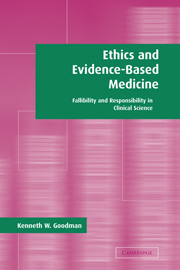Book contents
- Frontmatter
- Contents
- Preface
- Acknowledgments
- 1 Foundations and history of evidence-based practice
- 2 The research synthesis revolution
- 3 Evidence of evidence, and other conceptual challenges
- 4 Human subjects, the Internet, databases, and data mining
- 5 Evidence at the bedside
- 6 Public health policy, Uncertainty, and genetics
- 7 Ethics and evidence
- References
- Index
6 - Public health policy, Uncertainty, and genetics
Published online by Cambridge University Press: 29 September 2009
- Frontmatter
- Contents
- Preface
- Acknowledgments
- 1 Foundations and history of evidence-based practice
- 2 The research synthesis revolution
- 3 Evidence of evidence, and other conceptual challenges
- 4 Human subjects, the Internet, databases, and data mining
- 5 Evidence at the bedside
- 6 Public health policy, Uncertainty, and genetics
- 7 Ethics and evidence
- References
- Index
Summary
A skeptical farmer was raking leaves outside his barn when he saw a young woman from the city approaching. She carried a clipboard. “What are you selling?” he asked, almost rudely.
“Nothing,” she replied. “I'm not selling anything. I work for the Bureau of the Census.”
“What's that?”
“Well, I'm a census taker – we're trying to find out how many people there are in the country.”
“Well,” the man said, “you're wasting your time with me. I've got no idea.”
Research syntheses have influenced policy and practice in areas as diverse as exposure to environmental tobacco smoke, mammography, and otitis media. In all these cases, decision makers – from individual clinicians to policy evaluators – have had to proceed in an environment shaped by empirical uncertainty. How, generally, can one ethically optimize a public health decision when one is unsure of the lay of the land? This chapter will identify these and other key policy questions, and address the problems that attach to the use of research synthesis to guide or inform public policy and legislation. As above, a number of very interesting case studies are available to illustrate this. We conclude with a discussion about a science – genetics – that will further challenge our ability to make momentous decisions in scientifically fraught environments.
- Type
- Chapter
- Information
- Ethics and Evidence-Based MedicineFallibility and Responsibility in Clinical Science, pp. 113 - 128Publisher: Cambridge University PressPrint publication year: 2002



